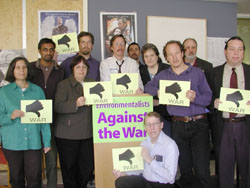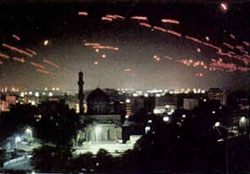'Environmentalists Against War' Calls for Peace
10 Reasons Environmentalists Oppose an Attack on Iraq, by Environmentalists Against War
March 7, 2003

 |
| Founding members of Environmentalists Against War vote "Thumbs Down" on Bush's sequel to his father's war. [If you would like a "Thumbs Down on War" poster for your home or office, send $1 to Gar Smith at The-Edge, c/o PO Box 27, Berkeley, CA 94701.] Credit: Kai-ping Liu / World Journal |
'Environmentalists Against War' Calls for Peace
In 1991, an international coalition of environmental organizations signed an International Call to Action warning of the grave environmental consequences of a war in the Middle East. The statement, issued before the beginning of Operation Desert Storm, warned of the potential for massive oil spills, burning wells, significant civilian deaths and a flood of refugees. All these predictions, unfortunately, came true.
On Thursday, February 20, 2003, many of these same organizations joined forces once more in a new coalition called Environmentalists Against War (EAW). At a press conference held in the Yosemite Room of the Sierra Club's San Francisco headquarters, EAW issued a new appeal opposing the resort to war on environmental grounds.
The coalition released "10 Reasons Environmentalists Oppose an Attack on Iraq," a statement endorsed by more than 40 environmental groups including Earth Island Institute, Rainforest Action Network, Bluewater Network, International Rivers Network and Project Underground.
The speakers addressed the potential environmental and public health problems caused by oil well fires, oil slicks, depleted uranium weapons, chemical and biological weapons and nuclear weapons.
Media present were KPIX-Channel 5, KQED, KGO, KPFA, Live105, World Journal, and some independent reporters. We also passed on information to some reporters who were not able to attend the event.
The speakers included Gar Smith, former editor of "Earth Island Journal" and current editor of "The Edge." Mr. Smith received a prestigious World Affairs Council award for his reporting on the environmental impacts of the 1991 Gulf War.
Juliette Majot, Executive Director of International Rivers Network, spoke of the role dams and rivers play in the geopolitics of conflict and the danger wars pose to water supplies -- a resource essential to live.
Gopal Dayaneni from Project Underground, discussed the impact of militarism on people of color and women.
Saul Bloom from Arc Ecology, presented a slide show on the past and expected future consequences of war in the Gulf region and cited evidence from the book he co-authored, "Hidden Casualties: Environmental, Health and Political Consequences of the Persian Gulf War.'
Dave Robinson from Pax Christi spoke movingly of his recent visit to Baghdad where he spent hours visiting hospital wards filled with children dying from leukemia and afflicted with birth defects linked to exposure to chemical contaminants released by the 1991 war.
Environmentalists Against War (EAW) will continue organize around the issue of war's impact on the environment. A new website is expected to debut soon.
Organizations or individuals wishing to endorse the coalition statement (or to join EAW and submit a separate statement) can contact EAW co-founder Peter Drekmeier (650) 223-3306.
10 Reasons Environmentalists Oppose an Attack on Iraq, by Environmentalists Against War
 |
| The nighttime bombing of Baghdad in 1991. |
As organizations and individuals working for the environment and environmental justice, we have watched with increasing concern as the US government moves closer to an all-out attack on Iraq. We raise our voices in opposition to this war and invite others to join us in support of peace. We oppose an attack on Iraq for the following reasons:
1. An attack on Iraq could kill nearly 500,000 people. Most of the people killed would be innocent civilians.
In November 2002, Medact, the British health professional organization, warned that as many as 260,000 Iraqis could die immediately from a US attack, while another 200,000 deaths would result from famine and disease. The UN fears that an attack would create a flood of 900,000 refugees.
2. War destroys human settlements and native habitats. War destroys wildlife and contaminates the land, air and water. The damage can last for generations.
The United Nations Environmental Program (UNEP) has documented lasting damage from the 1991 Gulf War. Oil, chemical and radiological pollution still contaminates the region. More than 60 million gallons of crude oil spilled from pipes. Some 1,500 miles of coast were tarnished with oil and cancer-causing chemicals. The deserts were scarred with 246 "lakes" of congealed oil. More than 700 oil wells burned for nine months, producing toxic clouds that blocked the sun and circled the Earth.
In the aftermath of the Gulf War, more than a dozen countries submitted environmental claims to the United Nations totaling $48 billion.
3. US clusterbombs, thermobaric explosions, electromagnetic bursts and weapons made with depleted uranium are indiscriminate weapons of mass destruction.
In the 1991 Gulf War, US forces reportedly fired nearly a million rounds of depleted uranium (DU) bullets and shells, leaving 300 tons of DU scattered across southern Iraq. DU (uranium-238) has a half-life of 4.5 billion years. According to the Army Environmental Policy Institute, ingesting DU "has the potential to generate significant medical consequences." The World Health Organization (WHO) warns that "children could receive greater exposure to DU when playing in or near DU impact sites. Typical hand-to-mouth activity could lead to high DU ingestion from contaminated soil." In the aftermath of the profound chemical and radiological contamination released during the 1991 war, cancer and leukemia rates in southern Iraq have increased six-fold.
4. Bombs pollute, poisoning the land with unexploded shells and toxic chemicals. Bombs can't locate or destroy hidden chemical or biological weapons (CBW), but they can cause the uncontrolled spread of deadly CBW agents.
According to Saudi Foreign Policy Advisor Adel al-Jubeir, the 1991 US attack on Iraq destroyed "not a single chemical or biological weapon." That may have been fortunate. On March 10, 1991, after the Gulf War had ended, US troops destroyed several weapons bunkers at Khamisiyah in southern Iraq. Five years later, the Pentagon admitted that the explosion released a cloud of CBW agents, exposing 100,000 US soldiers to mustard gas and sarin nerve gas.
5. Fighting a war for oil is ultimately self-defeating.
Our fossil-fuel-based economy pollutes our air, fouls our lungs and contributes to global climate change. The world needs to burn less oil, not more. Earth's remaining recoverable oil reserves are expected to peak soon and decline well before the end of the century. Waging wars to control an energy source that is finite will never achieve long-term national security. Oil-based economies must be replaced by technologies powered by clean, sustainable, renewable fuels.
6. Pre-emptive attacks are acts of aggression.
A "pre-emptive attack" would constitute an attack on the rule of international law, the dream of world peace embodied in the United Nations Charter, and the promise of environmental security enshrined in a host of global treaties. Attacking a city of 5 million people with hundreds of cruise missiles would constitute a war crime and a crime against humanity.
7. Aggression invites retaliation.
The CIA has concluded that Saddam Hussein would only be provoked to use chemical or biological weapons in self-defense - if the US launched an invasion bent on replacing him. Attacking Iraq would increase the probability of chemical, biological, and radiological attacks directed against US cities.
8. Increased military spending (to control access to the fuel that powers our oil-based economy) drains funds from critical social, educational, medical and environmental needs.
The war (and subsequent occupation of Iraq) is projected to cost as much as $200 billion. Meanwhile the economy teeters and unemployment soars while the administration cuts funding for environmental stewardship and basic human needs.
9. Militarization and the war on terrorism are eroding America's freedoms at home.
The US PATRIOT Act has been used to persecute immigrants and fuels an atmosphere of racism and fear. The terrorist threat has been used to justify removal of public information databases that provided communities with critical data on industrial hazards. There has been a clampdown on the Freedom of Information Act, a valuable tool that had been used to hold polluting corporations accountable for their actions. The PATRIOT Act criminalizes legal forms of political opposition to controversial government policies, thereby threatening legitimate political and environmental activism.
10. The US has threatened to strike Iraq with nuclear weapons - the ultimate weapons of mass destruction.
In December 2002, a US strategy report claimed that the US "reserves the right to respond with overwhelming force - including through resort to all out options - to the use of WMD (weapons of mass destruction) against the US, our forces abroad, and friends and allies." Bush administration officials stated that the threat of a nuclear first-strike did not constitute a policy change.
Bush's 2002 Nuclear Posture Review called for development of new nuclear weapons including earth-penetrating "bunker busters" and five-kiloton "mini-nukes" (four "mini-nukes" would contain the explosive force of the atomic bomb that destroyed Hiroshima).
If nuclear weapons are used in Iraq, Medact fears that 3.9 million people would die. The radioactive fallout would eventually circle the planet, dooming even more people to an early death.
Environmentalists Against War (650) 223-3306.
For more information contact:







